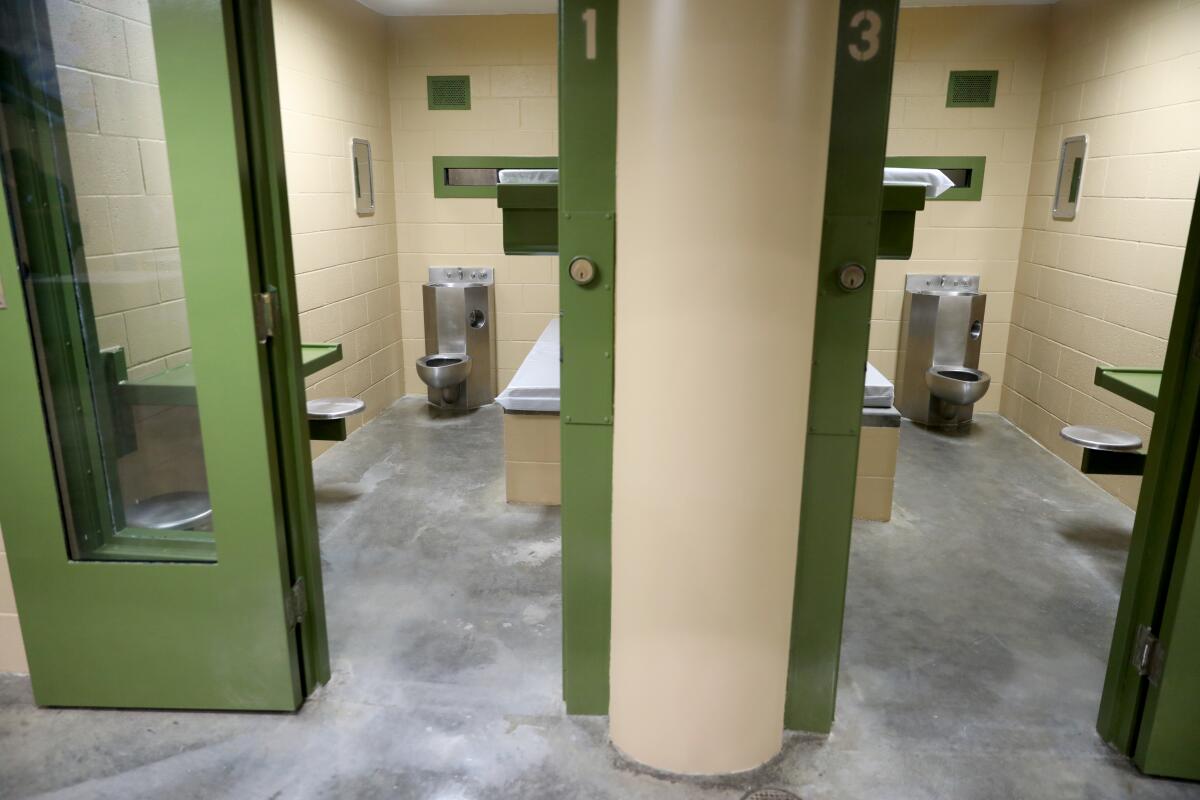Black and Latino people disproportionately booked in Orange County jails, study finds
- Share via
Black and Latino people made up the majority of Orange County jail bookings between 2010 and 2018, according to a recent report from a UCLA research team.
Latino and Black people accounted for about 47% and 7% of jail bookings despite making up about 35% and 2% of the county’s population, respectively. This indicates “significant racial disparities,” the study said. White people accounted for about 39% of the jail population while making up about 41% of the county’s population.
The research was conducted by Million Dollar Hoods, a team of scholars and activists based out of the university’s Ralph J. Bunche Center for African American Studies.
“Overall, the criminal justice system has shown itself time and time again to use racism as a driver to its operation,” said Danielle Dupuy, executive director of Million Dollar Hoods and director of research and programs at the Ralph J. Bunche Center for African American Studies.
Million Dollar Hoods conducted the study after it was requested by its community partner Transforming Justice Orange County, which aims to defund the carceral system and support people who have been impacted by incarceration.
For the study, the research team analyzed Orange County Sheriff’s Department booking data.
“We know that the carceral system is really built as a part of the system of oppression, and that is reflected in the data,” said Sarah Kahn, a UC Irvine law student and member of Transforming Justice OC. “Unsurprisingly, people of color are disproportionately targeted and persecuted by this system.
“We wanted this data presented so that it would be easy for people in our county to understand what was happening in Orange County jails.”

Kahn said one of the most glaring findings of the report is that charges related to substance use accounted for about 32% of all the jail bookings between 2010 and 2018. Driving under the influence and drug possession were among the three most common charges.
Driving under the influence was the most common charge against Black and Latino people. Drug possession was the most common charge against white people.
Though women made up about 21% of the bookings, they accounted for about 38% of the bookings for charges related to substance use. The report said this indicates a “significant gender disparity.”
“It’s very troubling to see that our county is engaging a carceral response to those kinds of social problems,” Kahn said.
Transforming Justice OC is part of a coalition of social justice groups that is working to halt the expansion of the James A. Musick jail near Irvine.
The Stop the Musick Coalition believes incarceration is not an effective treatment for social ills and is advocating for devoting the $289 million earmarked for the jail expansion toward social programs that address the root causes of crime, such as homelessness or mental illness.
“When you start to look into the data more deeply ... why are we incarcerating people who may be possessing drugs?” Dupuy said. “Do they have a substance use issue? Should they be treated in the community? These are questions I think that the community has the right to ask and the right to consider, especially when so much money is being poured into a system that doesn’t seem to work.”
In December, a judge ordered Orange County Sheriff Don Barnes to cut the county’s jail population in half due to COVID-19. Barnes chose to fight the order but ultimately lost his appeal.
Barnes and Dist. Atty. Todd Spitzer criticized the judge’s order and claimed it would result in the release of dangerous criminals.
“A judge’s ruling to reduce the inmate population in the Orange County jail system by half will release dangerous and violent criminals back into our neighborhoods to commit more crimes and victimize more people,” Spitzer said in a press release. “This is not fearmongering; it is a fact.”
Kahn said the study supports what social justice groups like Transforming Justice OC have contended, that a large portion of county inmates are not in jail for violent offenses. Kahn said that both Spitzer and Barnes were “fearmongering” with their comments about releasing inmates.
“It was factually inaccurate and I think it’s important that people in Orange County have a more realistic sense of who’s actually in our jails,” Kahn said.
In February, Spitzer announced in a press release that he would be implementing initiatives to address mass incarceration and systemic racism.
His comments were met with skepticism from progressive criminal justice reformers who believe his actions don’t align with his words.
“We as a society have engaged in systemic mass incarceration,” Spitzer said in the press release. “As a prosecutor, I will stop it. We as a society have prosecuted people of color differently. As a prosecutor, I will stop it.”
District attorney spokeswoman Kimberly Edds said on Wednesday that the office couldn’t comment on the study because it hasn’t had a chance to review it.

In response to a request for comment on the study, sheriff’s spokeswoman Carrie Braun said in an email that bookings into the Orange County jail system come from all law enforcement agencies in the county. Braun also pointed out that not everyone in Orange County jails are Orange County residents. People are booked in the county’s jails if the crime that they committed or are suspected of committing occurred in Orange County.
“It is the responsibility of the Sheriff’s Department to provide care for those in our custody, but it is all Orange County law enforcement agencies and the Courts that determine who come to the jail and how long they stay,” Braun said.
Dupuy and Kahn said Million Dollar Hoods may potentially conduct more studies on Orange County based on what is needed by its community partners.
“What COVID has shown in Orange County and L.A. County is that we can significantly reduce the jail population,” Dupuy said. “And because we can do that safely, why do we need to pour more money into building and expanding current jails? It seems like a waste of resources.”
All the latest on Orange County from Orange County.
Get our free TimesOC newsletter.
You may occasionally receive promotional content from the Daily Pilot.




